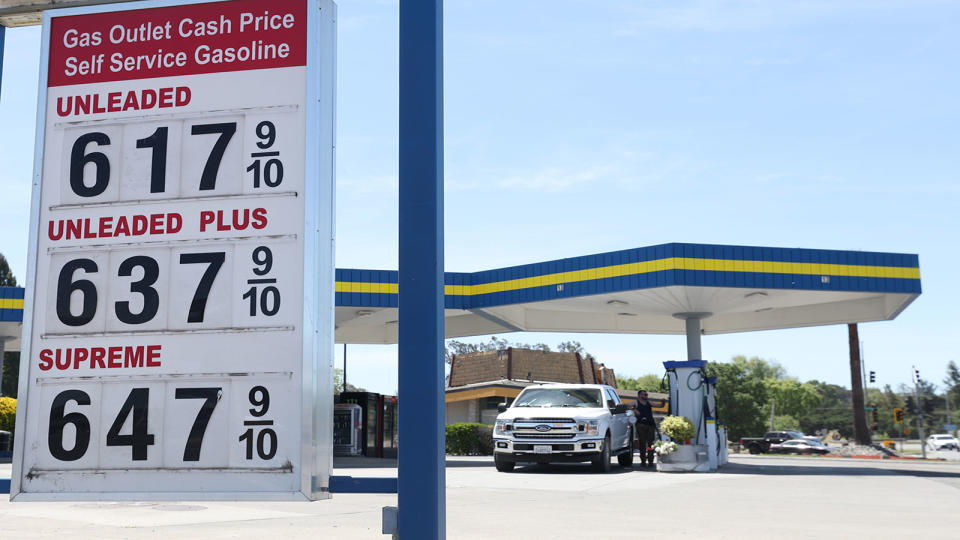Why Is Gas So Expensive at Certain Times of Year?

Unfortunately for drivers, we often see the highest gas prices during the summer, starting around Memorial Day. In May 2022, U.S. consumers paid an average of $1.50 per gallon more than they were at the same time in 2021, according to AAA.
Why is gas so expensive? The reasons are many and varied, but two causes were soaring inflation and the fact that many countries, including the United States, cut off oil imports from Russia — one of the world's top oil producers — due to the war in Ukraine.
This volatility has shaken up the crude oil markets and continues to push prices higher.
Crude Oil Prices
According to the U.S. Department of Energy (DOE), most (54 percent) of the you cost of gas at your local gas station can be attributed to crude oil prices.
Economic Growth
The U.S. Energy Information Administration (EIA) lists economic growth as one of the main factors impacting crude oil supplies (and prices). As economies grow, they require increased transportation, which in turn requires more fuel and higher demand for oil.
For example, the U.S. is one of the largest economies in the world. Despite being the world's biggest producer of oil, it is still a net importer of oil. Put simply, it takes a lot of fuel to run a big economy, and as countries race to increase their GDP, demand increases and gas prices rise for everyone.
OPEC
One international group that tends to have a major impact on crude oil prices is the Organization of the Petroleum Exporting Countries (OPEC). OPEC's 12 member countries include some of the world's largest oil reserves.
Together, Algeria, Congo, Equatorial Guinea, Gabon, Iran, Iraq, Kuwait, Libya, Nigeria, Saudi Arabia, United Arab Emirates and Venezuela control about 72 percent of the world's oil reserves, per EIA.
OPEC sets oil production targets for its member countries, and if the targets are low, that can lead to higher oil prices worldwide.
Geopolitical Events
Geopolitical conflict and political changes can have a major impact on gasoline prices.
For example, when Russia invaded Ukraine in 2022, the European Union (EU) and the Group of Seven (G7, which includes the United States) imposed sanctions on Russia, including restricting the country's oil refining capabilities. Following these sanctions, U.S. gas prices hit a record high, according to NPR.
Extreme Weather
According to the DOE, most of the refineries in the U.S. are located along the Gulf Coast. This region is especially vulnerable to hurricanes. Hurricanes on the Gulf Coast can delay refining, which leads to higher gas prices.
Extreme weather in other parts of the country can also cause high gas prices. For example, snow can increase demand as more people heat their homes; meanwhile, snow can cause road closures and oil transportation delays.
Taxes
Local taxes account for about 16 percent of the total price of gas, according to the DOE. The national average is 57 cents per gallon, but it varies widely by state.
California taxes gas higher than any other state, at about 87 cents per gallon.
Distribution, Marketing and Refining Costs
The DOE estimates that refining costs and refinery profits account for about 14 percent of the cost of gas, while distribution and marketing account for 16 percent. That means that about 1/3 of the retail price of gas is determined by factors like transportation costs and refinery operations.
Time of Year
Fuel prices typically increase every summer, and some of the reasons are fairly logical.
More people traveling, especially on family vacations and road trips, increases demand. Also, in the spring months, energy companies conduct maintenance on their refineries, shutting them down and limiting capacity until late May.
Because of these disruptions, oil supplies can become stretched. In addition, natural disasters (like hurricanes) can increase prices by disrupting transport routes and damaging refineries and other infrastructure.
Seasonal Gasoline Transition
But did you know that the gasoline sold during the summer is actually different — and more expensive to produce — than that sold in the winter?
Twice every year in the United States, the fuel supply changes. It's known as the seasonal gasoline transition (yes, winter gas vs. summer gas is a real thing). This change is the biggest reason for the price hike in summer gasoline. Depending on the time of year, gas stations switch between providing summer-grade fuel and winter-grade fuel.
The switch started in 1995 as part of the Reformulated Gasoline Program (RFG), which was established through the 1990 Clean Air Act Amendments. The Environmental Protection Agency (EPA) started the RFG program in order to reduce pollution and smog during the summer ozone season.
In order to reduce pollution, summer-blend fuels use different oxygenates, or fuel additives. These blends, the EPA says, burn cleaner and also help compensate for a limited oil supply.
This practice of using seasonal blends also encourages the development of alternative fuels. Remember that gasoline isn't just made up of processed crude oil; it's a blend of refined crude oil and different compounds and additives.
Summer vs. Winter Gas
So what's the difference between summer-grade and winter-grade fuel?
Summer-grade fuel burns cleaner than winter-grade fuel. This just means that it produces less smog and releases less toxic air pollutants. Winter-grade fuel has higher Reid Vapor Pressure (RVP), which means it can evaporate at lower temperatures — a must for living in a cold climate.
The actual difference in cost of production varies and it can add between 5 and 15 cents per gallon to the cost of your fill-up, according to Gas Buddy.
No matter the difference in production costs, the increase at the pump is even greater, owing to the summer driving season, dips in supply, maintenance costs and companies' converting to production of summer blends.
Original article: Why Is Gas So Expensive at Certain Times of Year?
Copyright © 2024 HowStuffWorks, a division of InfoSpace Holdings, LLC, a System1 Company

 Yahoo Finance
Yahoo Finance